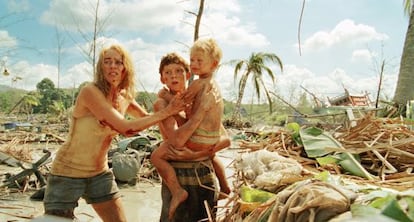Making ‘The Impossible’ possible
J. A. Bayona says he couldn’t have got his long-awaited second film off the ground today ‘The Orphanage’ director's movie is inspired by the 2004 tsunami


“I wouldn’t have been able to make this film today,” says Juan Antonio Bayona. “Definitely not with a wholly Spanish budget, which has given me absolute creative freedom.”
Released this week, The Impossible — the Barcelona-born director’s long-awaited second film after his hit 2007 ghost story The Orphanage — concerns a Western family caught up in the tsunami that swept across south-east Asia at Christmas in 2004. Shot in English, the Spanish-financed movie cost 30 million euros.
“It’s funny,” he says. “Nobody outside of Spain asks me about its nationality, even though I’m back from two festivals, Toronto and Zurich, where they applauded me when I told them it was Spanish.”
Maybe that’s because they know what state the country is in. The movie has no credits at the start — apart from the names of the production companies — that identify it as Spanish. Isn’t that the same kind of trick played by clothing retailer Zara, which seems to hide the nationality of its stores outside Spain? “No,” he explains. “I wanted the viewer to be dropped slap bang into the drama, only showing the title, The Impossible, at the end because the impossible will be what happens after, when the family goes back to life as if nothing had happened.”
The ending is known well enough: the real family on which the characters are based was Spanish, and they all survived — the parents and their three sons. But that does nothing to lessen the impact of its hard-hitting, Steven Spielberg-style emotional journey. “I was really interested in the original story, which deals with a theme that attracts me instinctively: growing up. It brings to mind the world of Spielberg, and his main theme. In film terms, I’ve learned a lot from watching his movies.” Bayona admits that Sergio G. Sánchez, now his go-to screenwriter, sold him the script for The Orphanage as a “dark version of Close Encounters of the Third Kind.”
Bayona likes to stress the emotional aspect of the film above the narrative. “It is a Western family — they could be mine — which is dealt a blow by reality, and forced to mature through their contact with death and get another perspective on life. I had to consider how to make the audience experience that journey, without any explanations, because neither did the characters themselves have time to ask questions, such as why they were saved and others weren’t, or why the disaster happened. Everything is an extreme experience. [...] It is not a version of a Hollywood-style disaster film. It is reality. At the end, they are flown out on a private jet, accompanied by a guy in a suit from an insurance company looking like he’s from another planet; he represents the real world to which they have to return. It was a tremendous shock to them.”
To raise money for the film they looked for international actors. “Ewan McGregor and Naomi Watts were the first options. They said yes. It shouldn’t seem strange to us. Who questions Lars von Trier’s cinema? But he films in English with actors such as Kirsten Dunst and Willem Dafoe. As Ewan says, The Impossible is Spanish, you have to be proud of the industry.”
Bayona knew that there was a story there right from the start. “[Producer] Belén Atienza heard María Belón [the real-life mother] tell her story on the radio. She repeated it to me as a colleague, and as I listened to her I knew there was a film. It was obvious. Because there was emotion there — it hit you. I tried to tell it myself but I couldn’t finish it... I thought that if I was capable of bringing it to the screen, it would be rewarding. And I go on thinking about what it has that transcends everything I know about the tsunami to be able to touch me in this way. At the heart of this drama are a mother and a child, a mother who has lost everything apart from what she is not willing to lose. That is what she passes to her son, and there any viewer can recognize themselves.”
Tu suscripción se está usando en otro dispositivo
¿Quieres añadir otro usuario a tu suscripción?
Si continúas leyendo en este dispositivo, no se podrá leer en el otro.
FlechaTu suscripción se está usando en otro dispositivo y solo puedes acceder a EL PAÍS desde un dispositivo a la vez.
Si quieres compartir tu cuenta, cambia tu suscripción a la modalidad Premium, así podrás añadir otro usuario. Cada uno accederá con su propia cuenta de email, lo que os permitirá personalizar vuestra experiencia en EL PAÍS.
¿Tienes una suscripción de empresa? Accede aquí para contratar más cuentas.
En el caso de no saber quién está usando tu cuenta, te recomendamos cambiar tu contraseña aquí.
Si decides continuar compartiendo tu cuenta, este mensaje se mostrará en tu dispositivo y en el de la otra persona que está usando tu cuenta de forma indefinida, afectando a tu experiencia de lectura. Puedes consultar aquí los términos y condiciones de la suscripción digital.








































